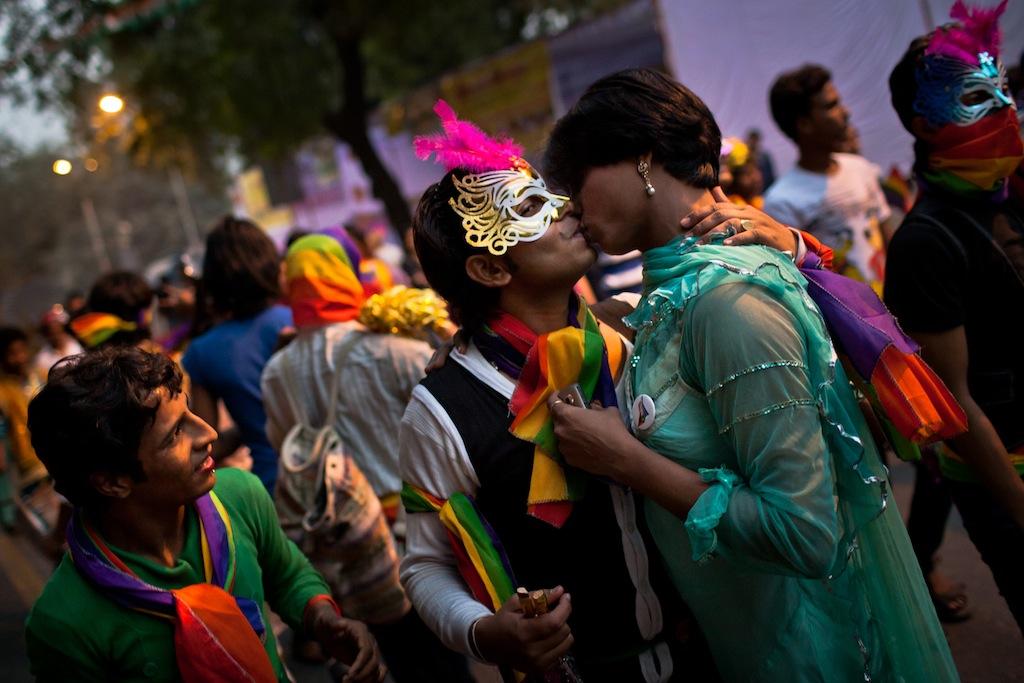LGBT Indians say life is changing, but not fast enough
Participants in the 4th Delhi Queer Pride 2011 March. The Indian LGBT community still faces discrimination and a legal status in limbo, despite positive steps.
NEW DELHI — The name ‘Naz’ is virtually synonymous for most of the Indian public with the fight to decriminalize homosexuality.
In 2009, the Naz Foundation waged a nine-year battle to change the law against homosexuality and won, but the fight isn’t over despite changing attitudes.
Naz is now anticipating a ruling from the Supreme Court after anti-gay groups appealed the decision, setting the stage for a ruling that will affect the rights of sexual minorities across the country.
The religious community, along with much of the general Indian population, hasn’t yet come to terms with recent changes in society and India’s gay community has long been forced to stay in hiding because of the threat of police action — or individuals taking matters into their own hands.
Anuradha Mukerjee, part of the team at the Naz Foundation, remembers how much harassment people faced from police. “If two men were sitting in a pub they would be harassed and asked for money,” she said, explaining that there was a significant amount of extortion going on.
Even now, three years later, Mukerjee still finds a massive pile of hate mail at the foundation’s doorstep each day when she comes to work, mostly from religious groups.
More from GlobalPost: Indian sex: What's unnatural, asks Supreme Court?
Though 85 percent of the country is Hindu, India is a religiously diverse country where Christians, Muslims, Jains, and Buddhists coexist. And on homosexuality, Mukherjee said, they formed a united front.
“[Homosexuality] was this one issue where all the religions are united against us,” she said.
The debate is centered on morality, and persists with gay relationships cast as outside behavioral norms.
“Actually according to me [homosexuality] is not nice. It should be banned,” said Prashand, 20, a Hindu college student. “It’s against the rules of nature. God made male and female to mate with each other but we are breaking the laws.”
This attitude is prevalent, said Mukerjee, partly because Hindu society is very concerned with lineage and it sees same sex couples as a threat to that.
A recent survey of Indian youth found that 86 percent of 18 to 25-year-olds are religious, and the future of LGBT rights in India rests on the shoulders of this generation. But the survey also found young people with liberal social views.
More from GlobalPost: Indian court to rule on legality of same-sex marriage
“[The youth] haven’t lived through decades of oppression. They’ve lived through this period of liberalization. They want everything and they want it now, including their sexual rights. They’re in a hurry,” said gay activist and photographer Sunil Gupta.
Gupta was one of the organizers of the first gay pride parade in Delhi, held in 2008, when homosexuality was still illegal. His book of photographs, “Wish You Were Here: Memories of a Gay Life” debuted in 2008 before the law was changed, at a time when no bookstores would carry a title that made reference to anything “gay.”
Although “gay nights” at popular clubs are becoming part of the urban landscape, as well as an upswing in pride parades in Delhi and other cities, while the laws have changed, Gupta says it’s still not a safe environment to come out in.
There still aren’t really any safe spaces for LGBT people, so gay youth spend a lot of time going to cruising spots – public toilets and parks, where people from the community connect. Some advocates hand out condoms and information about HIV and AIDS, which used to be considered criminal because lawmakers thought it encouraged gay sex.
Women like Kanika Talwar, heading home after watching the afternoon sports sessions at Delhi University, are adamant about individual civil rights; she is one of the young people Gupta is betting on to change Indian society.
“I think every individual has a path or a choice or a right that you may like anyone in the world," she said. "Anyone. So what is the problem if a man likes a man?”
This April, the Naz Foundation’s best lawyers and advocates made their argument once again. They are now waiting anxiously for the Supreme Court’s decision.
For more of GlobalPost's continued coverage of LGBT rights, check out our Special Report "The Rainbow Struggle."
We want to hear your feedback so we can keep improving our website, theworld.org. Please fill out this quick survey and let us know your thoughts (your answers will be anonymous). Thanks for your time!
